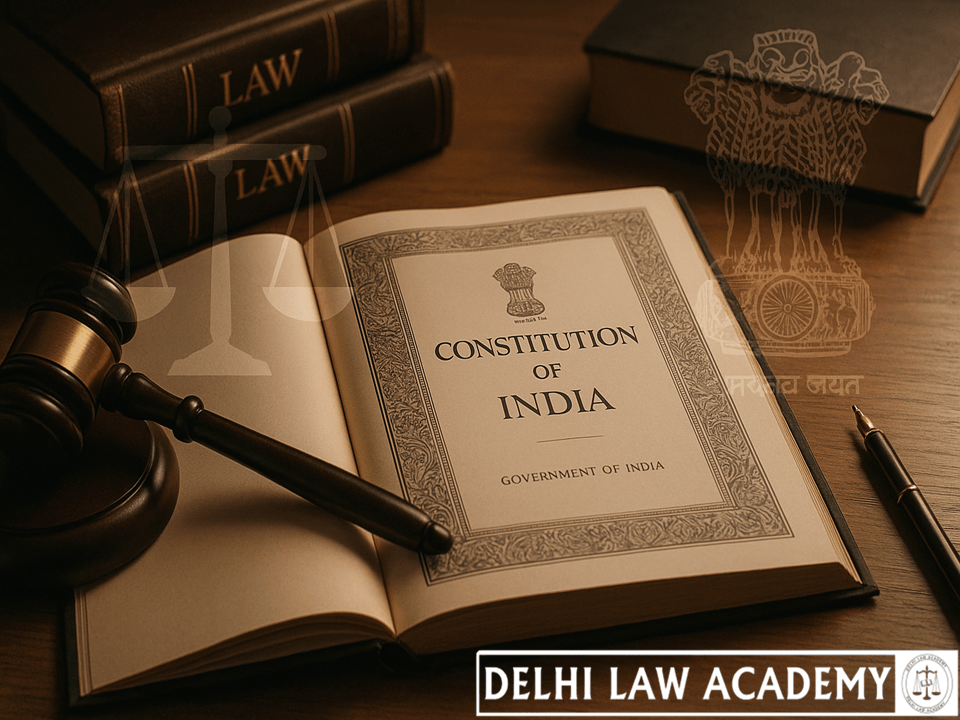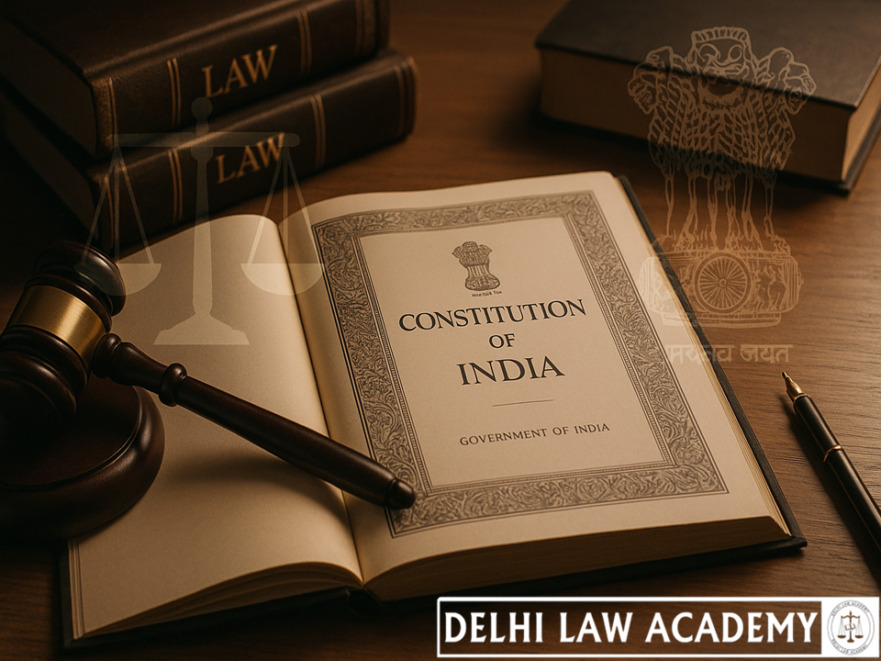
🏛️ Parliament (Articles 102–108)
Delhi Law Academy Jaipur — Notes for RJS, DJS, PCS(J) & Other Judicial Services
⚖️ Disqualifications for Membership — Article 102
- A person shall be disqualified for being chosen as and for being a member of either House if:
- He holds any office of profit under government
- He is of unsound mind, so declared by a court
- He is an undischarged insolvent
- He is not a citizen of India
- He is so disqualified under a law made by Parliament
- Disqualification shall not attach to offices declared by Parliament or to the office of a Minister.
- Article 102(2): A person shall be disqualified if he is disqualified under the Tenth Schedule.
🏛️ Decision on Disqualifications — Article 103
- Questions on disqualification under Article 102(1) are referred to the President.
- The President’s decision shall be final but must be based on the opinion of the Election Commission.
⚠️ Penalty for False Voting — Article 104
- Anyone who sits or votes in Parliament:
- Before taking the oath, or
- When not qualified, or
- When disqualified from membership
- Is liable to a fine of ₹500 for each day he so sits or votes.
🗣️ Privileges & Immunities — Article 105
- Freedom of speech in Parliament, subject to constitutional and procedural rules (Ref: Article 121).
- No MP is liable for court proceedings for anything said or any vote given in Parliament or its committees.
- No liability for authorized publication of reports or proceedings.
- Other privileges to be defined by Parliament; until then, same as British House of Commons.
- Ministers and Attorney General (Article 88) enjoy the same privileges.
📘 Additional Privileges (As per DLA)
- An MP cannot be arrested in civil cases during session or within 40 days before/after.
- An MP cannot be compelled to appear as a witness while Parliament is in session.
- No arrest within the precincts of the House without permission of the Presiding Officer.
- Parliament can punish for contempt or breach of privilege — applicable to members and outsiders.
- Example: Mrs. Indira Gandhi was expelled from the Lok Sabha and imprisoned for contempt in 1977.
💰 Salaries of Members — Article 106
- Parliament determines the salaries and allowances of its members by law.
- As of 2010, MPs receive:
- Salary ₹50,000 per month
- Constituency allowance ₹45,000 per month
- Office expense allowance ₹45,000 per month
- Daily allowance ₹2,000 per sitting
- Parliament has also provided pensions, though not constitutionally mandated.
📜 Passing of Ordinary Bills — Article 107
- Bills other than Money and Financial Bills may originate in either House.
- All such Bills must be passed by both Houses to become law.
- Lapsing of Bills: A Bill pending in Lok Sabha or passed by Lok Sabha but pending in Rajya Sabha lapses on dissolution of Lok Sabha.
- However, a Bill does not lapse upon prorogation of the Houses.
🏛️ Joint Sitting of Parliament — Article 108
- Joint sitting conditions:
- Bill passed by one House and rejected by the other
- Houses disagree on amendments
- Bill pending in other House for over six months
- This clause does not apply to Money Bills.
Procedure for Joint Sitting:
Step 1️⃣ President notifies intention to summon both Houses for a joint sitting — from this point, neither House proceeds with the Bill.
Step 2️⃣ President summons the Houses for the joint sitting. The Bill is passed by a majority of total members present and voting.
Step 1️⃣ President notifies intention to summon both Houses for a joint sitting — from this point, neither House proceeds with the Bill.
Step 2️⃣ President summons the Houses for the joint sitting. The Bill is passed by a majority of total members present and voting.
Note: Joint sittings have been held only 3 times — in 1961, 1978, and 2002.
📚 For more Constitution & Polity Notes, visit
Delhi Law Academy Jaipur
📘 Stay Ahead with Delhi Law Academy!
Get access to free monthly current affairs, read our insightful blogs,
and explore free study resources prepared by experts at DLA Jaipur. 🚀
❓ Frequently Asked Questions on Parliament (Articles 102–108)
⚖️ What are the disqualifications for being a Member of Parliament under Article 102?+
Article 102(1) lists grounds such as holding an office of profit, being of unsound mind, an undischarged insolvent, not being an Indian citizen, or being disqualified under any law made by Parliament. Disqualifications under the Tenth Schedule also apply.
🏛️ Who decides questions relating to disqualification of MPs?+
As per Article 103, any question about disqualification under Article 102(1) is decided by the President of India. The President must obtain and act according to the opinion of the Election Commission of India.
🗣️ What privileges and immunities do Members of Parliament enjoy under Article 105?+
Article 105 grants MPs freedom of speech in Parliament and immunity from legal proceedings for anything said or voted upon in Parliament or its committees. They also enjoy additional privileges such as exemption from arrest in civil cases during sessions.
💰 Who decides the salaries and allowances of Members of Parliament?+
According to Article 106, Parliament itself determines the salaries and allowances of its members by passing laws. Currently, MPs receive fixed monthly salaries, constituency allowances, and daily sitting allowances.
📜 What is a joint sitting of Parliament and when does it occur?+
Under Article 108, a joint sitting is convened by the President when one House passes a Bill and the other rejects it, fails to act on it for six months, or disagrees on amendments. The Bill is then decided by a majority of members of both Houses present and voting.
⚠️ What penalty is imposed for sitting or voting illegally in Parliament?+
As per Article 104, any person who sits or votes in Parliament without taking the oath, without being qualified, or while disqualified, must pay a fine of ₹500 for each day they so sit or vote.
Contact us
📍 Delhi Law Academy – Jaipur Branch
6C, Tower 2, Coaching Hub, Pratap Nagar, Jaipur – 302033
📞 Phone:
+91 9911916552
+91 8447285606
✉️ Email:
contactus@delhilawacademy.com

